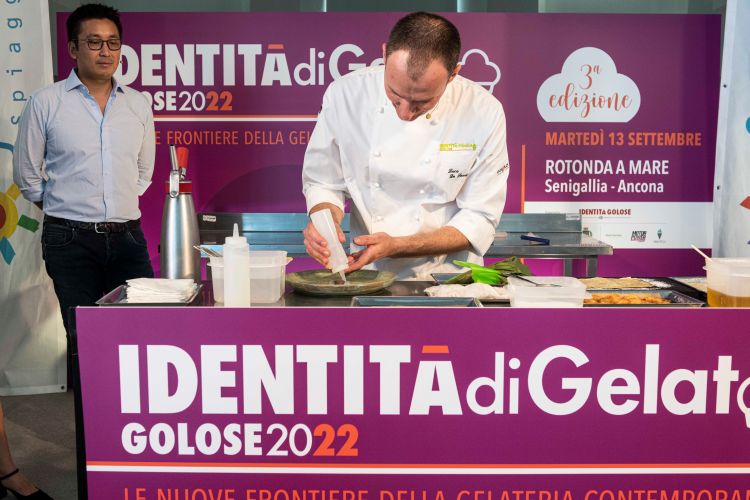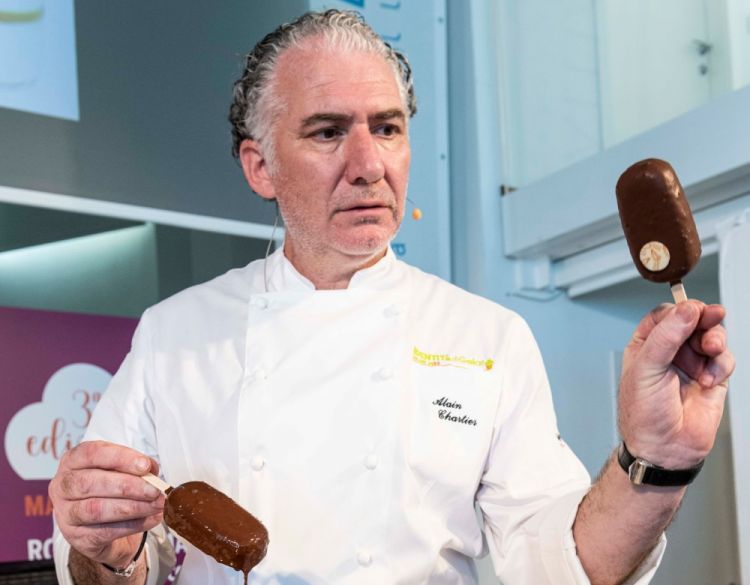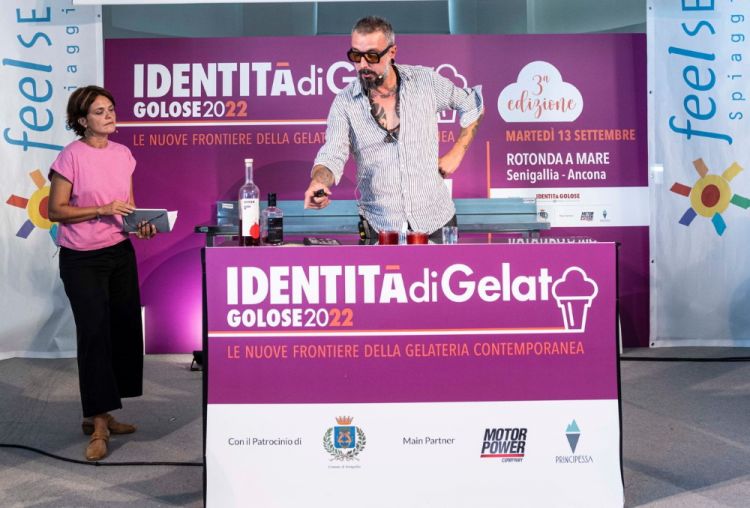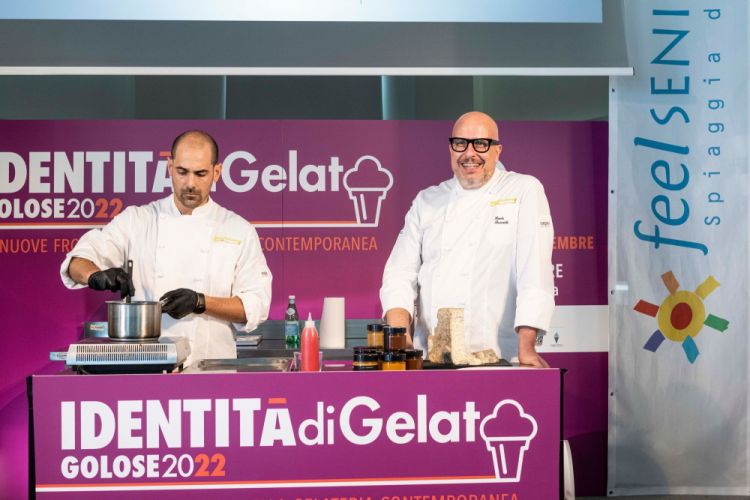La Rotonda a Mare in Senigallia, a round sphere floating above the sea (which with a bright day felt like it was still summer) has confirmed its retro charm. It hosted the third edition of Identità di Gelato. A 360-degree story on gelato, under the theme of the new frontiers of contemporary ice cream making, which developed through the stories and testimonies of chefs, ice cream makers, pastry chefs and mixologists.
After the article on the first part of the event (click here), here is the second "wave" of lessons. Enjoy.
CLAUDIO LIU and LUCA DE SANTI

Claudio Liu and Luca De Santi. Below, the gelato they presented
The works of the afternoon session started again with a step towards an international approach, with the presence on stage of
Claudio Liu, born in China and raised between Reggio Emilia and Milan, the person behind some big successes in Milan like
Iyo Experience and
Aalto, both awarded with a Michelin star. With him, designing the "sweet meeting between Italy and Japan", the pastry chef from
Iyo Experience Luca De Santi, who started to collaborate with
Liu after very important experiences including
Enoteca Pinchiorri,
Peck,
Ratanà. «
Iyo was born from a dream – said
Liu – which came true in 2007, and it started from the idea of making an
izakaya, a Japanese trattoria, which over the years grew and we hope it will continue to do so. Our cuisine is inspired by Japan, it is authentic but not traditional, and the same goes for our pastry making. When I met
Luca De Santi a few years ago, I was struck by his technique: our partnership was excellent from the start,
Luca is a pastry chef in constant evolution».
«I come from very different experiences – said
De Santi – but I’ve always had the goal of using as little sugar as possible. Japanese cuisine is rich in sugars in its recipes and for this reason traditional pastry making seems instead rather unsweet. What we do at
Iyo, thanks also to the partnership with chef
Katsumi Soga, is to present pastries that create a bridge between Western techniques and Japanese products, working on a further decrease in sugars. Gelatos and sorbets have a very important role in our offer. They have a menu of their own and are also part of some dishes».
For the dessert presented at
Identità di Gelato,
De Santi used products that are almost unknown in Italy, like
yuba, the skin of soy milk, which you make in almost the same way you would with cow’s milk. «It really is very similar to milk skin, but since it’s made with soy, it’s completely vegetal. Starting from this idea, I started to think of a cake suitable for people with allergies, also because Japanese cuisine makes no use of dairy products: so we prepared a cake for everyone, because even those who have no allergies will enjoy it».
Yuba is brushed with a vegetal butter made at
Iyo, and then baked to create a pastry similar to phyllo. We then add a crispy version to the dish, and without sugar, a classic jam of red beans,
anko. The heart of the dessert is a sorbet of peach and yuzu, to which we add a gel of Moscato, a mousse of almond milk and some fresh peaches.
ALAIN CHARTIER

Alain Chartier and below the ice cream he presented
The following guest at
Identità di Gelato was the first "foreigner" in these three editions in Senigallia, but most of all he’s one of the great protagonists of international gelato making. He’s been world ice cream champion multiple times,
M.O.F Glacier (best artisanal ice cream maker in France) and a great success over the years.
Alain Chartier talked about
Glaces toute l'année, the title of his book published in 2017, explaining how, to de-seasonalise gelato, you must move towards «frozen cakes. We present a frozen version of every sweet we make: snacks, cakes, eclairs... We also follow the celebrations, Saint Valentine, Easter, Christmas, always following this inspiration».
At
Identità di Gelato he presented a project dedicated to ice creams on sticks, a line with 18 variations, with different ingredients and always the presence of chocolate, another crucial element of
Chartier’s professional passion. Indeed, after collaborating for 25 years with an important brand like
Valrhona, the French pastry chef started a personal research project, so that he now makes chocolate himself, using less saccharose and including natural sugars to lower the glycaemic index, and making a line of vegan chocolate bars.
In the ice creams on sticks he presented on stage, and prepared live, chocolate is both inside, in the shape of small tubes of cold chocolate placed in the middle of a sorbet of raspberries from Bretagne, and in the outside covering, with the use of 70% Madagascar chocolate plus cocoa grues and salt.
OSCAR QUAGLIARINI

Oscar Quagliarini and below, the “different” Milano-Torino he presented
Contemporary ice cream making seen from the point of view of a mixologist who is also an artisan of taste and a "nose", that is to say «an extraordinary researcher of fragrances», as
Silvia Cittadini pointed out when presenting him. And here comes on stage
Oscar Quagliarini, world renown bartender; in Senigallia he has created a lab called
Le Garagiste, where he makes vermouth, bitter, gin and spirts with the attention of a craftsman. There’s more: he analyses aromas with a special attention to the connections these have with cocktails and to the virtuosos of scents compared to flavours, also with reference to food. In other words,
lupus in fabula: because this further step towards ice cream making – not banal – was the soul of a lesson titled
Alchermes and malaga: the new frontiers, which was very appreciated.
This is also because the city of Senigallia, where
Paolo Brunelli works, played its part. The (ice cold,
ça va sans dire) fusion between these two talents has given surprising results; the basic idea, as
Quagliarini explained, was to «introduce two products in ice cream making», namely alchermes and malaga wine, «which have always been used in pastry and ice cream making. In fact what I’m trying to do, with the help of
Paolo, is let bartenders know these can be an excellent ingredients for cocktails». An example?
Milano-Torino, «it’s basically an
Americano without soda»: why not replace vermouth with alkermes? Or malaga wine? «The nice thing is that they are all classic ingredients, but interpreted in a modern» and high quality way, hence not a retail chain bottle of alchermes, two litres full of colorants, but an excellent liqueur, and totally natural «which I have studied with
Brunelli».
The latter, called on stage, told about the
Malaga 2.0 project: in this case too, as for the alchermes made by the two and presented at
Identità Milano in 2019, the question was to «fill the gap, linked to the very small availability of Malaga wine». How so? By making one in a different region, in the Marche.
Quagliarini: «We rented some vineyards of local Moscatello, to which we add alcohol and a special sugar, then we add burnt sugar with some natural extracts that add an aroma of vanilla. Basically these are six different aromas that recall the aroma of vanilla, but without the vanilla». The result is used for the maceration of the raisins (through osmosis: at least three weeks in a vacuum), essential to make a gelato flavour - malaga that is – which
Brunelli wants to make popular once again. The tasting confirms this: the two have succeeded.
Paolo Marchi: «It’s like a cloud».
And after alchermes, in 2019, and the brand new "Malaga marchigiano", are there any new products born from the meeting of ice cream making and mixology, that
Quagliarini and
Brunelli are researching? «To tell the truth, we have already presented one in 2020, at
Identità on the road: the
Brunelli numero 5», an essence that recalls the famous perfume by Chanel and aromatises a white chocolate gelato. We "shoot it" with a blow drier using the air that forms in the ice cream during the process». Genius.
PAOLO BRUNELLI

Paolo Brunelli, to the right. In the photo below, the ice cream he presented
The last masterclass at Rotonda a Mare in Senigallia closed circle, because it was the story of another ice cream maker and entrepreneur born in the inland of the Marche who transformed this city by the sea into his headquarters:
Paolo Brunelli.
Paolo has often had fun in changing the old rules that often connect some classics of ice cream making popular in the Eighties to low quality industrial products. This time it’s the turn of toppings and garnishes, words that recall the large plastic bottles you must turn upside down and pour on gelato and panna cotta, with ingredients that range from saccharose to chemical aromas.
The research of sauces that would add a noble touch to his gelato has led
Brunelli to rediscover Piedmontese
cugna, a compote of fruit and spices born as a pairing with boiled meat, which is now served to in the recipe created by the ice cream maker (apples, spices like juniper, and Sichuan pepper plus a very small percentage of honey), together with a blue cheese from the Marche made with raw buffalo milk, a suave and soft embrace, thanks to the extraordinary milk which has 7% fat. Meanwhile, he also presented the buffalo milk gelato, perfect for cugna, or a rich caramel, one of the recipes on which
Brunelli is working, thanks to the use of
Roboqbo, which allows to make sauces while fully respecting the ingredients.
«The universe of fine sauces opens endless possibilities, to give to a good traditional ice cream a gourmet appearance –
Paolo explained – thanks to a good product, with a gratifying flavour and easy to use, because closed in a tub and with a decent shelf life».
Content by Silvia Cittadini and Niccolò Vecchia
Translated into English by Slawka G. Scarso